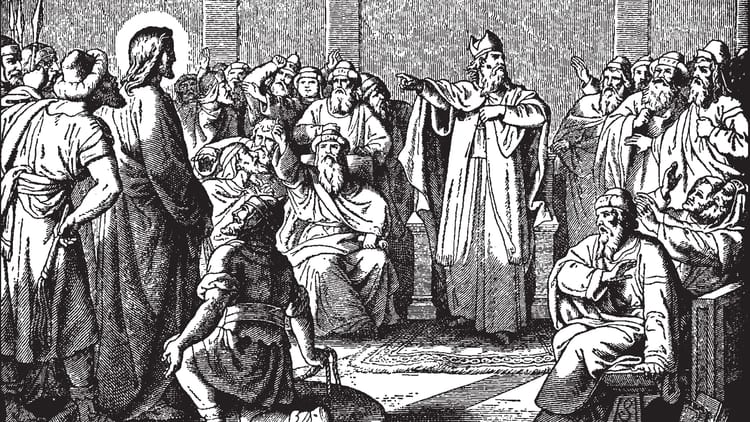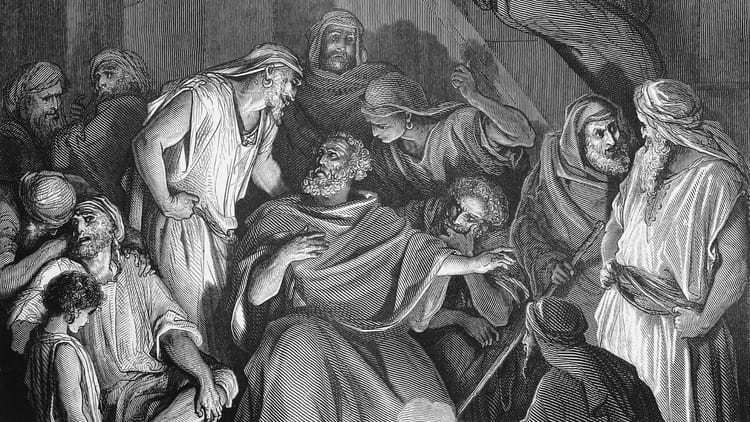The Kingdom of God Has Come Near (Mark 1:14-45)

Last week we began to look at the Gospel of Mark. Mark is the written record of an eyewitness account of the ministry of Jesus Christ. It’s short and punchy. I really encourage you to not just read the Gospel of Mark, but to listen to it. It was designed to be heard, and when you hear it, it grabs you.
Today we come to the heart of what Jesus is all about. Many people respect Jesus as a moral teacher or as a prophet or a great man. In this passage, we have a brief and significant summary of his ministry, followed by stories that illustrate his ministry. It's almost like Jesus’ whole ministry and message in a nutshell.
So let’s look at the passage we just read and ask: What is Jesus all about? Secondly, what does it look like? Finally, what does this have to do with us?
First question: What is Jesus all about?
Before we decide to accept or reject Jesus, we really have to understand: what is Jesus all about? What was his message? If you had just thirty seconds to get to the heart of who Jesus is and what he came to do, what would you say?
Right off the bat, Mark gives us an incredibly important summary statement of the message of Jesus Christ. This is the most important summary in the entire book, and possibly one of the most important summaries in the entire Bible. Verses 14 and 15 say:
After John was put in prison, Jesus went into Galilee, proclaiming the good news of God. “The time has come,” he said. “The kingdom of God has come near. Repent and believe the good news!”
What is Jesus all about? Whatever it is, Mark says that it is good news that is proclaimed. We need to stop and camp here for a minute, because this is a point that we sometimes missed. Some of us are wearing ties this morning. If you're wearing a tie, someone likely showed you how to tie it one day by standing behind or beside you and demonstrating. Take this end and wrap it around here, and then flip it over here, and then slide it through here, and so on. I guarantee you that nobody ever handed you a book of words that explained how to tie a tie. Why? Because some things are best taught through demonstration rather than words.
Other things, however, are best taught through words. The news is a good example. When Obama won the election last November, the news was announced to us with words. Even if you watched TV, the news came through words. You saw happy people celebrating, but didn't understand why until someone explained the news. Some things are better demonstrated; other things need to be spoken.
We’re going to see in this passage that the good news of Jesus Christ is something that is both announced and demonstrated. But here we see that the gospel is about good news. Tim Keller puts it this way:
Suppose a king goes out to defend his lands from an invading army. If the king is defeated by the enemy, he sends back military advisors to advise the people how to shore up the cities defenses and save themselves. But if the king defeats the invading army, he sends back messengers (heralds, good-newsers) with the news: “We have defeated the enemy. Rejoice and live in that victory.”
Now apply that to religion: Every other religion sends military advisors to put in place rites, rituals, and laws so fearful people can try to save themselves. Christianity sends “good-newsers” to say, “Jesus has won! Rejoice and live in light of that victory.”
Unfortunately, advice is not found only in other religions, there are people in the Christian Church who think the gospel is good advice and are fearfully trying to save themselves and others by obeying Jesus. That is not the gospel! The gospel is the news that Jesus has saved us and obeying him comes from that joy!
Advice is counsel about what you can do about something that hasn’t happened yet. News is about something that has happened. The gospel is good news.
What is this good news that has to be announced, and that will change our lives? Verse 15 says: “The time has come…The kingdom of God has come near. Repent and believe the good news!”
Here is the central message of Jesus: the waiting is over. The time has now come. God is doing something new, something that the whole world has been waiting for centuries to see. What is it? The kingdom of God has finally come near. God’s reign has finally arrived.
Imagine for a minute that you own a house and rent it out. But then you discover that the tenants have been mistreating the place. They have kicked holes in the walls. They have broken the windows. The heat’s been turned off because they didn’t pay the bills. They have junk all over the yard. The place is an absolute disaster. The house that you owned, that was in perfect condition when you rented it out, has been all but destroyed.
You try to take the house back, but they get a lawyer and fight the eviction order. But finally, after months of waiting, you take back possession of the house. You repair and paint the walls. You clean up the mess. You fix the windows. You get everything fixed to the way that it should have been.
The believers in the Old Testament looked around and saw that the world had been good, but that sin had destroyed much of what was good. The world around them was far from the world that God intended. The world is filled with violence, wickedness, death, and disease. But they believed that one day God would once gain take over, and that he would repair all that is broken, and that he would reign unopposed over the transformed universe. All that is crooked would be made straight; all that is wrong would be made right.
Jesus came and said, “The time has come. The reign of God has come near. God is setting things the way they should have been in the first place. He’s restoring things to the way they should be.” This is good news that has to be announced.
But it’s also news that requires a response. In a way, we’re like the people who lived in that broken-down house and have been party to its destruction. Now Jesus invites us – those who are responsible for the destruction in the first place – to turn around and join him in the restoration. Jesus says in verse 15, “Repent and believe the good news!” Repent literally means to change one’s mind in a way that affects your whole life – to change your way of thinking and living, to turn the direction of your life. Repentance and belief is the essence of what it means to be a disciple of Jesus Christ.
Jesus wants us to understand that his ministry marks the coming of God’s kingdom – that through him, God is beginning the process of restoring all creation. How will you react? The only way that makes any sense is to change your way of thinking and living; to believe what Jesus said and live in light of that reality.
That’s what Jesus is all about. This helps us understand Jesus’ whole life and ministry in a nutshell: the kingdom of God has come near. Mark doesn’t leave it at the abstract level, though. He answers a second question:
Second question: What does it look like?
Verses 21 to 39 essentially give us a day in the life of Jesus. We see Jesus teaching, casting out a demon, healing, and preaching. This is more than a random collection of stories. Mark is giving us a sample of what it looks like for the kingdom of God to come near in the ministry of Jesus Christ. Jesus has proclaimed the coming of the kingdom; here he demonstrates the coming of the kingdom. What does it look like?
Verses 21 and 22 show us one aspect of what it looks like. It involves people understanding the truth. You see this also in verses 38 and 39. Jesus teaches and preaches, but it’s not just like any preaching or teaching. Jesus doesn’t get his authority by quoting other rabbis, as was common in synagogues. But when Jesus preaches, he amazes them. His preaching has authority.
You may wonder why there’s such an emphasis on teaching and preaching, not only in Jesus’ ministry but throughout the New Testament. It’s because in the kingdom of God, people come to know and understand who God is and what he’s up to. Sometimes we think that it’s more important to do than to know, but Scripture corrects us: both are important. We need to love and serve God, but we must also know him and what he’s up to. Habakkuk foretold a day when “the earth will be filled with the knowledge of the glory of the LORD as the waters cover the sea” (Habakkuk 2:14). Jesus preaches and teaches so people understand what God has revealed about himself, so they can know and love God.
But then we see that there’s more. We’re going to see what can only be described as two miracles that take place this day. Miracles are not random displays of God’s power. They’re much more than that. They are actually foretastes of what life will be like one day when God’s kingdom is fully here. Every miracle we encounter in the gospels is a foretaste, a pointer, to what life will be like when the kingdom arrives in its fullness.
So when Jesus casts out a demon in verses 23-28, we see that Jesus has authority over the supernatural forces of evil, and that points us to the day that the devil and his powers will be completely defeated. The Bible teaches us that the devil is a liar and a murderer (John 8:44), and that he comes to steal, kill and destroy (John 10:10). We’ve seen Satan and his works. Jesus shows us that the announcement of the kingdom is the announcement that he was authority over evil, and that evil will be completely declawed and defeated.
And then Jesus shows us that what’s broken will be restored. The account of the miracle in verses 29 and 30 is the shortest miracle account in all the gospels, and I love it. Jesus encounters sickness and immediately heals Peter’s mother-in-law. Once Jesus heals her, she doesn’t even need a period of recovery. She’s up serving the guests. She’s completely back to what she would have been doing. Jesus even cares for mothers-in-law.
Verses 32 and 33 say:
That evening after sunset the people brought to Jesus all the sick and demon-possessed. The whole town gathered at the door, and Jesus healed many who had various diseases.
I love the miracle recorded at the end of this chapter. Not only does Jesus heal a leper, but he touches the untouchable. Instead of the leprosy making Jesus unclean, Jesus’ touch makes the leper clean.
Jesus points us to a day that there will be no need for hospitals, nursing homes, or the Centre for Addiction and Mental Health. He will straighten everything that’s crooked. He will restore everything that is broken. The world will be filled with the knowledge of the glory of God; Satan will lose all his power; everything will be restored to the way it should be. Everything sad will become untrue.
The Jewish people prayed for the day that the kingdom of God would be established over all the people of the earth; that God will reign unopposed over the universe and transform all things. Jesus says that the waiting is over, and the kingdom has come near. The restoration has begun.
This leaves just one question: What does this have to do with us?
You may have noticed that I skipped over the very first thing that Jesus did in his ministry. He called Simon and Andrew, James and John to be his disciples. We read that in verses 16 to 21.
The first thing that Jesus did in his ministry is to create a community of followers. As he announces a kingdom, he calls people to follow him.
Jesus called these first disciples, and they serve as a kind of pattern for the response that Jesus expects from us as well. So as we close this morning, we close knowing that God is up to something new. It began with the ministry of Jesus: the kingdom is coming. God is setting everything right. He’s returning things to the way they should be. And he invites us to be part of what he’s doing. He’s created a community of followers who will join him in what he is doing.
On one hand, this is very good news. The fact that Jesus chooses us is remarkable. I’m really encouraged as well that Jesus didn’t call superstars. We’re going to see in the coming chapters that Simon, Andrew, James, and John are flawed and imperfect. God doesn’t call perfect people to himself. He calls imperfect people like us to follow him.
But there’s a cost. You see this all throughout this passage. John the Baptist is in prison. At the end of the chapter we have a small hint of the conflict that is going to break open very soon in the ministry of Jesus. Not only that, but Jesus calls the disciples to follow him by leaving their small but prosperous businesses, their families, and their homes.
Jesus also shows us the type of dependence that’s required. He’s busier than ever, and yet at his busiest he slips away and spends hours praying. Jesus is showing us the type of relationship that we will need to have with the Father if we are to follow him.
As the Gospel of Mark begins, Mark gives us an introduction to who Jesus is. And he then gives us the central thrust of Jesus and his ministry through summary and example. Best of all, he invites us to join the community of his disciples and to follow him.
It’s not going to be without cost. But the invitation is extended to ordinary people to join Jesus in his extraordinary mission. The good news is that God’s kingdom has come in the person of Jesus Christ. But the good news demands your response.
Father, thank you for clearly revealing in Mark who Jesus is and what he is up to. We thank you that the kingdom has come near, and that you have begun the work of restoring all things.
Thank you also, Father, that the first thing Jesus did is to invite a community of followers to join him in what he is doing. May we revel in wonder that you’ve invited us to follow Jesus; but may we also count the cost, knowing that following your Son demands our all.
Make us into a community of disciples who will join Jesus in what he is doing. We pray in Jesus’ name, Amen.





